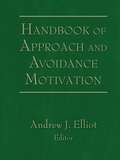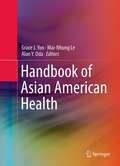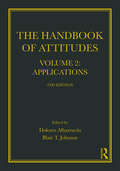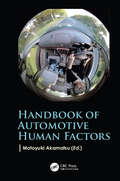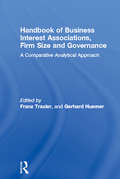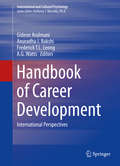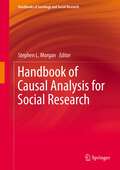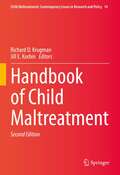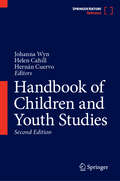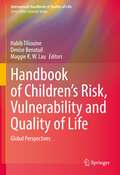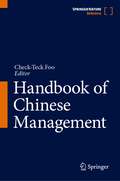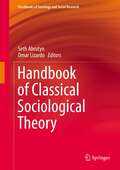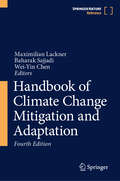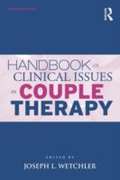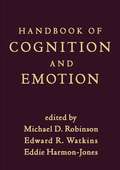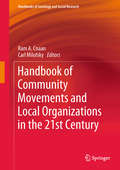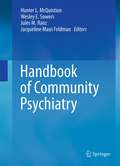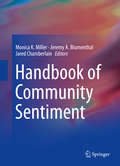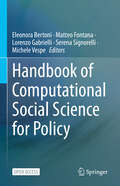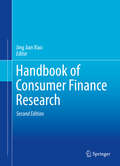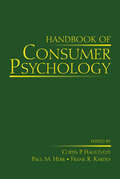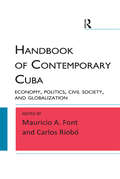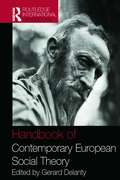- Table View
- List View
Handbook of Approach and Avoidance Motivation
by Andrew J. ElliotOf the many conceptual distinctions present in psychology today, the approach-avoidance distinction stands out as one of, if not the, most fundamental and basic. The distinction between approach and avoidance motivation has a venerable history, not only within but beyond scientific psychology, and the deep utility of this distinction is clearly evident across theoretical traditions, disciplines, and content areas. This volume is designed to illustrate and highlight the central importance of this distinction, to serve as a one-stop resource for scholars working in this area, and to facilitate integration among researchers and theorists with an explicit or implicit interest in approach and avoidance motivation. The main body of this volume is organized according to seven broad sections that represent core areas of interest in the study of approach and avoidance motivation, including neurophysiology and neurobiology, and evaluative processes. Each section contains a minimum of four chapters that cover a specific aspect of approach and avoidance motivation. The broad applicability of the approach-avoidance distinction makes this Handbook an essential resource for researchers, theorists, and students of social psychology and related disciplines.
Handbook of Asian American Health
by Grace J. Yoo Alan Y. Oda Mai-Nhung LeAsian Americans encounter a range of health issues often unknown to the American public, policy makers, researchers and even clinicians. National research often combines Asian Americans into a single category, not taking into account the differences and complexity among Asian ethnic subgroups. The definition of Asian American derives from the U.S. Census Bureau's definition of Asian, which includes peoples from all the vast territories of the Far East, Southeast Asia and the South Asian Subcontinent. While Census classifications determine demographic measurements that affect equal opportunity programs, the broad rubric "Asian-American" can never describe accurately the more than 50 distinct Asian American subgroups, who together comprise multifaceted diversity across cultural ethnicities, socio-economic status, languages, religions and generations. This volume rectifies that situation by exploring the unique needs and health concerns of particular subgroups within the Asian American community. It consolidates a wide range of knowledge on various health issues impacting Asian Americans while also providing a discussion into the cultural, social, and structural forces impacting morbidity, mortality and quality of life. The volume is designed to advance the understanding of Asian American health by explaining key challenges and identifying emerging trends faced in specific ethnic groups and diseases/illnesses, innovative community-based interventions and the future needed areas of research.
Handbook of Attachment, Second Edition
by Jude Cassidy Phillip ShaverFrom foremost authorities, this comprehensive work is more than just the standard reference on attachment-it has "become indispensable" in the field. Coverage includes the origins and development of attachment theory; biological and evolutionary perspectives; and the role of attachment processes in personality, relationships, and mental health across the lifespan. New to This Edition A decade's worth of major theoretical and empirical advances. Chapters on foster care, attachment in middle childhood, affect regulation, divorce, the neuroscience of attachment, and attachment in later life. Findings on disorganized attachment and psychopathology.
Handbook of Attitudes, Volume 2: 2nd Edition
by Dolores Albarracin Blair T. JohnsonAttitudes are evaluations of people, places, things, and ideas. They help us to navigate through a complex world. They provide guidance for decisions about which products to buy, how to travel to work, or where to go on vacation. They color our perceptions of others. Carefully crafted interventions can change attitudes and behavior. Yet attitudes, beliefs, and behavior are often formed and changed in casual social exchanges. The mere perception that other people—say, rich people— favor something may be sufficient to make another person favor it. People’s own actions also influence their attitudes, such that they adjust to be more supportive of the actions. People’s belief systems even change to align with and support their preferences, which at its extreme is a form of denial for which people lack awareness. These two volumes of The Handbook of Attitudes provide authoritative, critical surveys of theory and research about attitudes, beliefs, persuasion, and behavior from key authors in these areas. This second volume covers applications to measurement, behavior prediction, and interventions in the areas of cancer, HIV, substance use, diet, and exercise, as well as in politics, intergroup relations, aggression, migrations, advertising, accounting, education, and the environment.
Handbook of Automotive Human Factors
by Motoyuki AkamatsuThanks to advances in computer technology in the last twenty years, navigation system, cabin environment control, ACC, advanced driver assistance system (ADAS) and automated driving have become a part of the automobile experience. Improvement in technology enables us to design these with greater flexibility and provide greater value to the driver (human centered design). To achieve this, research is required by laboratories, automobile and auto parts manufacturers. Although there has been a lot of effort in human factors research and development, starting from basic research to product development, the knowledge and experience has not been integrated optimally. <p><P>The aim of this book is to collect and review the information for researchers, designers and developers to learn and apply them for further research and development of human centered design of future automotive technologies. Automotive human factors include psychological, physiological, mathematical, engineering and even sociological aspects. This book offers valuable insights to applying the right approach in the right place.
Handbook of Aviation Human Factors
by John A. Wise Daniel J. Garland V. David HopkinA complete examination of issues and concepts relating to human factors in simulation, this book covers theory and application in space, ships, submarines, naval aviation, and commercial aviation. The authors examine issues of simulation and their effect on the validity and functionality of simulators as a training device. The chapters contain in d
Handbook of Business Interest Associations, Firm Size and Governance: A Comparative Analytical Approach
by Franz Traxler Gerhard HuemerThis Handbook presents a theory of Business Interest Associations and fifteen empirical country by country case studies in the EU. The book is organized into three main parts. Part I develops a theory of business associations which centres on firm size as the key explanatory variable. Part II consists of country studies covering the EU-15, which are written along strictly comparable lines of analysis. Part III contains the cross-nationally comparative analysis. The book will make essential reading for researchers working in organization studies, industrial relations, industrial sociology and political science, as well as practioners in related fields.
Handbook of Career Development
by Gideon Arulmani Anuradha J. Bakshi Frederick T. L. Leong A. G. WattsThis book is focused on work, occupation and career development: themes that are fundamental to a wide range of human activities and relevant across all cultures. Yet theorizing and model building about this most ubiquitous of human activities from international perspectives have not been vigorous. An examination of the literature pertaining to career development, counseling and guidance that has developed over the last fifty years reveals theorizing and model building have been largely dominated by Western epistemologies, some of the largest workforces in the world are in the developing world. Career guidance is rapidly emerging as a strongly felt need in these contexts. If more relevant models are to be developed, frameworks from other cultures and economies must be recognized as providing constructs that would offer a deeper understanding of career development. This does not mean that existing ideas are to be discarded. Instead, an integrative approach that blends universal principles with particular needs could offer a framework for theorizing, research and practice that has wider relevance. The central objective of this handbook is to draw the wisdom and experiences of different cultures together to consider both universal and specific principles for career guidance and counseling that are socially and economically relevant to contemporary challenges and issues. This book is focused on extending existing concepts to broader contexts as well as introducing new concepts relevant to the discipline of career guidance and counseling.
Handbook of Causal Analysis for Social Research
by Stephen L. MorganWhat constitutes a causal explanation, and must an explanation be causal? What warrants a causal inference, as opposed to a descriptive regularity? What techniques are available to detect when causal effects are present, and when can these techniques be used to identify the relative importance of these effects? What complications do the interactions of individuals create for these techniques? When can mixed methods of analysis be used to deepen causal accounts? Must causal claims include generative mechanisms, and how effective are empirical methods designed to discover them? The Handbook of Causal Anlaysis for Social Research tackles these questions with nineteen chapters from leading scholars in sociology, statistics, public health, computer science, and human development.
Handbook of Child Maltreatment (Child Maltreatment #14)
by Richard D. Krugman Jill E. KorbinThe second edition of this successful handbook, edited by well-known experts in this field, includes core questions in the field of child abuse and neglect. It addresses major challenges in child maltreatment work, starting with “What is child abuse and neglect?” and then examines why maltreatment occurs and what are its consequences. The handbook also addresses prevention, intervention, investigation, treatment as well as civil and criminal legal perspectives. It comprehensively studies the issue from the perspective of a broader, international and cross-cultural human experience. Apart from a thorough revision of existing chapters, this edition includes many new chapters covering recent developments in this area and other issues not covered in the first edition. There is more focus on substance abuse, psychological abuse, and on social and community involvement and public health provisions in the prevention of child maltreatment. The handbook examines what is known now and more importantly what remains to be researched in the coming decades to help abused and neglected children, their families and their communities, thereby taking the field forward.
Handbook of Children and Youth Studies
by Johanna Wyn Helen Cahill Hernán CuervoThis second edition of the handbook gives a new scientific perspective to youth and childhood studies as multi scientific and interdisciplinary subjects which as such have not yet found their own framing in a particular discipline. It provides theoretical and methodological key debates and issues that develop and add an understanding of childhood and youth research discipline from a broader perspective. The Handbook on Children and Youth Studies draws on current thinking, but also challenges theoretical and conceptual orthodoxies in the field, drawing on interdisciplinary thinking and critical perspectives. It focuses on childhood and youth to address the emerging consensus that the boundaries between childhood, youth and adulthood are blurred. The view that defining youth and childhood largely in terms of problem topics is out dated. Instead, the handbook focuses on 16 themes that are open to international perspectives and to different conceptual approaches. Each theme is edited by a pair of field editors, thereby capturing a plurality of views. The 16 themes as a starting point are globally timely and they need scientific debates on the boundaries between childhoods, youth and adulthood. This handbook will meet the needs of childhood and youth researchers and the academics in the field. It recognizes the changing social context of the lives of children and young people, while developing theoretical frameworks and discussing about the core substantive issues of Children and Youth Studies.
Handbook of Children’s Risk, Vulnerability and Quality of Life: Global Perspectives (International Handbooks of Quality-of-Life)
by Habib Tiliouine Maggie K. W. Lau Denise BenatuilThis handbook makes a major contribution to the growing international research and policy interest in children’s experienced well-being or quality of life in childhood, linking it to ongoing research on children’s risk and vulnerability. The editors and contributors adopt the broader concept of ‘risk’ in addition to ‘vulnerability’. Not much work considers the connections between risks that children experience and their quality of life. In examining children’s quality of life, the chapters discuss various issues of risk and vulnerability that may affect their lives and also how the quality of childhood might be enhanced and maintained even in the face of these factors. The chapters discuss experiences of violence and abuse; access to basic services such as housing, health and education; and children’s vulnerability due to broader external factors such as war, conflict, and environmental events. The volume also includes the impacts of new technologies on children and the consequent risks and vulnerabilities they may face, alongside the benefits.This important volume brings together a diverse range of perspectives from established experts and emerging scholars in these fields of work. It covers a wide range of geographical and cultural contexts, and includes theoretical, empirical, policy and practice-based contributions. This handbook is a natural first point of reference for academics and policy professionals interested in quality of life, well-being, and children's rights.
Handbook of Chinese Management
by Check-Teck FooThis handbook explores the theme of managing inside China and consists of chapters that communicate the major managerial concepts within the context of Mainland China. Its key emphasis is to clearly highlight the differences in the art of managing in China vs. the West, while acknowledging that these differences may be narrowing as a result of globalization. Chapters in the book elaborate on how management is affected as China experiences rapid change while some aspects of Chinese culture remain unchanged and steeped in tradition. The book goes further in exploring this complexity by juxtaposing China’s orientation towards interpersonal relations, or "guanxi", with the government’s emphasis on law, which is now becoming more rule-based than before. Business & Management academics and practitioners will gain useful insight into Chinese management practices and their contrast to established Western ones when they use the Handbook of Chinese Management as a reference.
Handbook of Classical Sociological Theory (Handbooks of Sociology and Social Research)
by Seth Abrutyn Omar LizardoThis is the first handbook focussing on classical social theory. It offers extensive discussions of debates, arguments, and discussions in classical theory and how they have informed contemporary sociological theory. The book pushes against the conventional classical theory pedagogy, which often focused on single theorists and their contributions, and looks at isolating themes capturing the essence of the interest of classical theorists that seem to have relevance to modern research questions and theoretical traditions. This book presents new approaches to thinking about theory in relationship to sociological methods.
Handbook of Climate Change Mitigation and Adaptation
by Maximilian Lackner Wei-Yin Chen Baharak SajjadiNow in its 4th, extended edition, this completely revised and significantly expanded handbook addresses important new research findings and the global need for action related to climate change in its two most relevant aspects: mitigation and adaptation.There is a growing consensus that anthropogenic activities have been driving global climate change, and the consequence will be catastrophic for civilization. Reducing the 37.1 billion metric tons of CO2 produced annually (2017 global emissions) along with other greenhouse gases, particularly methane, has become a leading grand challenge and the pursuit of sustainable energy, environments, and economies is a complex issue affecting the daily life of every citizen.In this 4th edition, readers will find new chapters covering the causes and impacts of global warming, the climate change impacts on health, biodiversity, and the economy, and emerging technologies for climate change mitigation. Particular attention is given to topics such as wildfire threats, ocean acidification, coral bleaching, sea level rise, and permafrost thaw. The latest research on sustainable aviation fuels, carbon mineralization, and smart cities is also covered in this new edition, as well as topics like sustainable building design, climate-resistant building materials, and sustainable agriculture. The Handbook of Climate Change Mitigation and Adaptation collates information in this multi-disciplinary area, providing readers with a comprehensive overview of the scientific background and current and emerging technologies. Intended for an interdisciplinary, global audience of researchers and decision-makers at universities and in industry, it covers climate change models; established, mature, and promising future technologies and ideas; the impact of climate change; strategies for dealing with global warming; the related political frameworks; and climate education.
Handbook of Clinical Issues in Couple Therapy
by Joseph L. WetchlerNow updated in its second edition, Handbook of Clinical Issues in Couple Therapy provides a comprehensive overview of emerging issues that impact couple therapy. Unlike other guides that concentrate more on theoretical approaches, this invaluable resource contains the latest research and perspectives that every clinician needs when dealing with the challenging issues often found in practice. Carefully referenced, it explores a range of issues that include intimate partner violence, posttraumatic stress disorder and its effect on couple relationships, divorce therapy, remarriage and cohabitation issues, cultural issues, and couple therapist training. This insightful edited volume is suitable for a wide spectrum of readers, including couple and family therapists, counselors, psychologists, social workers, pastoral counselors, educators, and graduate students.
Handbook of Cognition and Emotion
by Eddie Harmon-Jones Edward R. Watkins Michael D. RobinsonComprehensively examining the relationship between cognition and emotion, this authoritative handbook brings together leading investigators from multiple psychological subdisciplines. Biological underpinnings of the cognition-emotion interface are reviewed, including the role of neurotransmitters and hormones. Contributors explore how key cognitive processes--such as attention, learning, and memory--shape emotional phenomena, and vice versa. Individual differences in areas where cognition and emotion interact--such as agreeableness and emotional intelligence--are addressed. The volume also analyzes the roles of cognition and emotion in anxiety, depression, borderline personality disorder, and other psychological disorders.
Handbook of Community Movements and Local Organizations in the 21st Century (Handbooks Of Sociology And Social Research Ser.)
by Ram A. Cnaan Carl MilofskyThis new handbook builds on The Handbook of Community Movements and Local Organizations published in 2007, and is the only resource defining the field of study related to small nonprofit organizations and to studying communities from the standpoint of associations that make up communities. It explores the history and conceptualizations of community, theoretical concepts in community organizations, social movements ranging from health to crime, and community practice methods. Further it provides authoritative statements of major theory areas, gives examples of different sub areas of the field, provides guidance to people working as practitioners in the field, and nicely coincides with the increasing interest in clinical sociology. This handbook is of great interest to academics, students and practitioners with an interdisciplinary resource to understand and collaborate in work with contemporary communities.
Handbook of Community Psychiatry
by Jacqueline Maus Feldman Hunter L. Mcquistion Wesley E. Sowers Jules M. RanzDuring the past decade or more, there has been a rapid evolution of mental health services and treatment technologies, shifting psychiatric epidemiology, changes in public behavioral health policy, and increased understanding in medicine regarding approaches to clinical work that focus on patient-centeredness. These contemporary issues need to be articulated in a comprehensive format. The American Association of Community Psychiatrists (AACP), a professional organization internationally recognized as holding the greatest concentration of expertise in the field, has launched a methodical process to create a competency certification in community psychiatry. As a reference for a certification examination, that effort will benefit enormously from a comprehensive handbook on the subject.
Handbook of Community Sentiment
by Monica K. Miller Jeremy A. Blumenthal Jared ChamberlainThis volume is the most comprehensive reference book on community sentiment available. The classic book about community sentiment is Norm Finkel's "Commonsense Justice: Jurors' Notions of the Law" (1995). A similarly influential book called "Justice, Liability, and Blame" was published at the same time, examining lay sentiment about a variety of criminal issues and suggesting ways in which the substantive criminal law could be reformed in light of such lay responses (Robinson & Darley, 1995). Although these books were influential and important for their time (and since), this Handbook expands significantly on them, both by updating research since that time and broadens the scope of topic areas to ones that are not limited to trial and criminal justice issues. Each chapter is original/unpublished and focuses on an area related to children/families, many of which are "hot topic" areas in the news and courts today. For instance, the U. S. Supreme Court decided a case in June 2012 about the constitutionality of "life without parole" for juvenile offenders--a topic discussed in the Fass and Miora chapter. Thus, it is of interest to those interested in family law topics as well.
Handbook of Computational Social Science for Policy
by Eleonora Bertoni Matteo Fontana Lorenzo Gabrielli Serena Signorelli Michele VespeThis open access handbook describes foundational issues, methodological approaches and examples on how to analyse and model data using Computational Social Science (CSS) for policy support. Up to now, CSS studies have mostly developed on a small, proof-of concept, scale that prevented from unleashing its potential to provide systematic impact to the policy cycle, as well as from improving the understanding of societal problems to the definition, assessment, evaluation, and monitoring of policies. The aim of this handbook is to fill this gap by exploring ways to analyse and model data for policy support, and to advocate the adoption of CSS solutions for policy by raising awareness of existing implementations of CSS in policy-relevant fields. To this end, the book explores applications of computational methods and approaches like big data, machine learning, statistical learning, sentiment analysis, text mining, systems modelling, and network analysis to different problems in the social sciences. The book is structured into three Parts: the first chapters on foundational issues open with an exposition and description of key policymaking areas where CSS can provide insights and information. In detail, the chapters cover public policy, governance, data justice and other ethical issues. Part two consists of chapters on methodological aspects dealing with issues such as the modelling of complexity, natural language processing, validity and lack of data, and innovation in official statistics. Finally, Part three describes the application of computational methods, challenges and opportunities in various social science areas, including economics, sociology, demography, migration, climate change, epidemiology, geography, and disaster management. The target audience of the book spans from the scientific community engaged in CSS research to policymakers interested in evidence-informed policy interventions, but also includes private companies holdingdata that can be used to study social sciences and are interested in achieving a policy impact.
Handbook of Consumer Finance Research
by Jing Jian XiaoThis second edition of the authoritative resource summarizes the state of consumer finance research across disciplines for expert findings on--and strategies for enhancing--consumers' economic health. New and revised chapters offer current research insights into familiar concepts (retirement saving, bankruptcy, marriage and finance) as well as the latest findings in emerging areas, including healthcare costs, online shopping, financial therapy, and the neuroscience behind buyer behavior. The expanded coverage also reviews economic challenges of diverse populations such as ethnic groups, youth, older adults, and entrepreneurs, reflecting the ubiquity of monetary issues and concerns. Underlying all chapters is the increasing importance of financial literacy training and other large-scale interventions in an era of economic transition. Among the topics covered: Consumer financial capability and well-being. Advancing financial literacy education using a framework for evaluation. Financial coaching: defining an emerging field. Consumer finance of low-income families. Financial parenting: promoting financial self-reliance of young consumers. Financial sustainability and personal finance education. Accessibly written for researchers and practitioners, this Second Edition of the Handbook of Consumer Finance Research will interest professionals involved in improving consumers' fiscal competence. It also makes a worthwhile text for graduate and advanced undergraduate courses in economics, family and consumer studies, and related fields.
Handbook of Consumer Psychology (Marketing and Consumer Psychology Series)
by Curtis P. Haugtvedt Paul M. Herr Frank R. KardesThis Handbook contains a unique collection of chapters written by the world's leading researchers in the dynamic field of consumer psychology. Although these researchers are housed in different academic departments (ie. marketing, psychology, advertising, communications) all have the common goal of attaining a better scientific understanding of cognitive, affective, and behavioral responses to products and services, the marketing of these products and services, and societal and ethical concerns associated with marketing processes. Consumer psychology is a discipline at the interface of marketing, advertising and psychology. The research in this area focuses on fundamental psychological processes as well as on issues associated with the use of theoretical principles in applied contexts. The Handbook presents state-of-the-art research as well as providing a place for authors to put forward suggestions for future research and practice. The Handbook is most appropriate for graduate level courses in marketing, psychology, communications, consumer behavior and advertising.
Handbook of Contemporary Cuba: Economy, Politics, Civil Society, and Globalization
by Carlos Riobo Mauricio A. FontCuban studies is a highly dynamic field shaped by the country's distinctive political and economic circumstances. Mauricio A. Font and Carlos Riobo offer an up-to-date and comprehensive survey offering the latest research available from a broad array of disciplines and perspectives. The Handbook of Contemporary Cuba brings contributions from leading scholars from the United States, Cuba, Europe, and other world regions and introduces the reader to the key literature in the field in relation to rapidly changing events on the island and in global political and economic affairs. It also addresses timely developments in Cuban civil society and human rights. The guide also presents economic models and forecasts as well as analyses of the recent, pivotal Sixth Congress of the Communist Party of Cuba. For students, scholars, and experts in government, it is a vital addition to any collection on Latin American studies or global politics.
Handbook of Contemporary European Social Theory
by Gerard DelantyThis innovative publication maps out the broad and interdisciplinary field of contemporary European social theory. It covers sociological theory, the wider theoretical traditions in the social sciences including cultural and political theory, anthropological theory, social philosophy and social thought in the broadest sense of the term. This volume surveys the classical heritage, the major national traditions and the fate of social theory in a post-national and post-disciplinary era. It also identifies what is distinctive about European social theory in terms of themes and traditions. It is divided into five parts: disciplinary traditions, national traditions, major schools, key themes and the reception of European social theory in American and Asia. Thirty-five contributors from nineteen countries across Europe, Russia, the Americas and Asian Pacific have been commissioned to utilize the most up-to-date research available to provide a critical, international analysis of their area of expertise. Overall, this is an indispensable book for students, teachers and researchers in sociology, cultural studies, politics, philosophy and human geography and will set the tone for future research in the social sciences.
